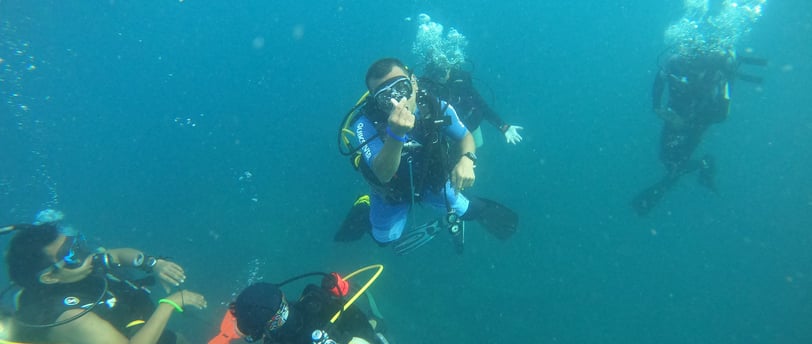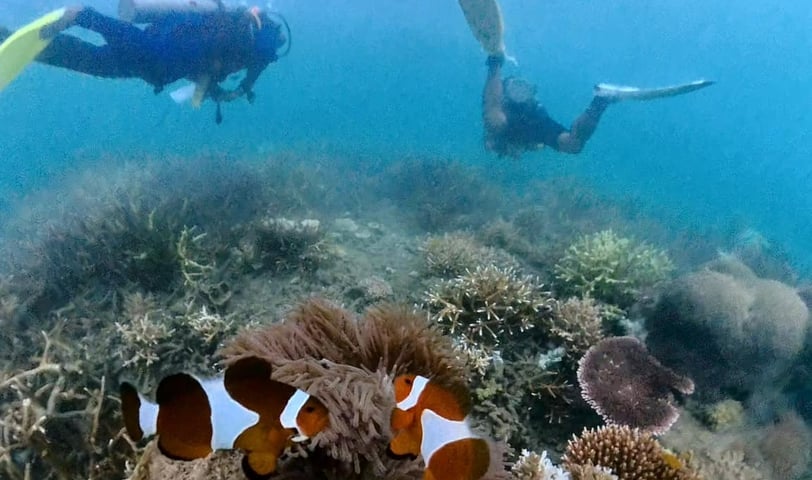From Beginner to Advanced: A Reflective Guide on Scuba Diving Skills and Next Steps
Join me on a journey from beginner to advanced scuba diving as I reflect on key skills learned in my Open Water course and explore why the Advanced Open Water certification is the natural next step. Discover practical insights and how to further enhance your diving experience.
DIVE JOURNEY
Author: DiverGen
8/17/20247 min read


Having just completed the open water course, it's a perfect moment to reflect on what you've learned and how you can apply this knowledge practically. This reflection will also explore why progressing to the Advanced Open Water course is a valuable next step, and where you might focus your efforts for further improvement.
Key Takeaways from the Open Water Course
1. Mastering Basic Scuba Diving Skills
The open water course is fundamentally about developing core scuba diving skills. You’ve learned to set up and use essential gear, including the regulator, buoyancy control device (BCD), and dive computer. Each piece of equipment plays a crucial role in ensuring a safe and enjoyable diving experience.
Practical Application: Understanding how to assemble and operate your scuba gear is crucial. In real-world scenarios, this means being able to prepare for dives independently, troubleshoot minor equipment issues, and perform pre-dive safety checks efficiently. This competence ensures that you can focus on the dive itself rather than getting bogged down by equipment problems.
2. Mastering Buoyancy Control and Breathing Techniques
Buoyancy control and breathing techniques are cornerstones of scuba diving. The open water course has taught you how to achieve neutral buoyancy using your BCD and your breathing. Proper buoyancy allows you to float effortlessly and avoid damaging the underwater environment.
Practical Application: Mastering buoyancy control enhances your diving experience by reducing physical exertion and conserving air. It also helps prevent accidental damage to marine life and coral reefs. By practicing these techniques regularly, you’ll become more adept at maintaining stability underwater, which will make your dives more enjoyable and less tiring.
3. Understanding the Buddy System and Underwater Communication
The buddy system is a critical aspect of diving safety. Your course emphasized the importance of staying close to your dive buddy and using hand signals for communication. This system ensures that you have support in case of emergencies and helps you coordinate underwater activities.
Practical Application: In practical terms, effective communication and teamwork with your dive buddy are vital for safety and enjoyment. Being able to quickly and clearly convey information through hand signals ensures that you can manage any issues that arise underwater. This teamwork also means you’re better prepared to handle emergencies, share equipment, or provide assistance if needed.
4. Navigating Underwater
The ability to navigate underwater is another essential skill you’ve developed. You’ve learned to use a compass and identify natural landmarks to help you stay oriented during a dive. This skill is particularly useful in areas with limited visibility or when exploring new dive sites.
Practical Application: Good navigation skills allow you to plan your dives effectively and avoid getting lost. Whether you’re diving in open water, around wrecks, or in challenging environments, being able to navigate accurately will help you return safely to your starting point and explore dive sites more thoroughly.
5. Using Dive Tables and Computers
Dive tables and computers are tools that help you manage your dive time and depth to avoid decompression sickness. The course introduced you to the principles behind dive tables and how to use dive computers to track your depth, time, and nitrogen levels.
Practical Application: Understanding dive tables and computers is essential for planning dives that keep you within safe limits. A dive computer simplifies this process, but knowing how to interpret its readings and use dive tables effectively ensures that you can make informed decisions and dive safely.
Applying Your Knowledge in Practical Scenarios
1. Independent Dive Planning and Execution
With the skills and knowledge gained from your open water course, you’re now capable of planning and executing dives independently. You can assess dive conditions, select suitable sites, and make decisions based on your training.
Practical Application: Planning your dives involves checking weather conditions, understanding the dive site, and preparing your gear. Your ability to manage these elements ensures that you can undertake dives with confidence and enjoy a range of underwater experiences.
2. Enhancing Your Diving Experience
As you continue to dive, the skills you’ve learned will enhance your overall experience. Mastery of buoyancy, communication, and navigation will make each dive more enjoyable, allowing you to focus on the beauty of the underwater world rather than managing equipment or handling difficulties.
Practical Application: With improved skills, you’ll find diving to be more relaxed and rewarding. This comfort will enable you to engage more deeply with the underwater environment, observe marine life more closely, and appreciate the diverse ecosystems you encounter.
3. Building a Strong Foundation for Advanced Diving
The open water course provides a solid foundation for further learning. The skills you’ve developed are the building blocks for more advanced diving techniques and certifications. Each dive you undertake will reinforce and expand upon the basics, preparing you for new challenges.
Practical Application: Your ongoing practice and experience will refine your skills and prepare you for advanced diving opportunities. By continually building on the foundation established in the open water course, you’ll be ready to tackle more complex dive scenarios and explore new underwater environments.
Why Consider Taking the Advanced Open Water Course?
Having completed the open water course, you might be considering the next step in your diving journey. The Advanced Open Water course offers several benefits that can enhance your diving skills and open up new opportunities.
1. Expanding Your Diving Skill Set
The Advanced Open Water course introduces new skills and experiences, such as deep diving, night diving, and advanced navigation. These skills allow you to explore a broader range of dive sites and handle more challenging conditions.
Practical Application: By learning these advanced techniques, you can dive deeper and explore new types of underwater environments. For example, deep diving allows you to visit shipwrecks or underwater formations that are beyond the reach of open water divers. Night diving offers the chance to experience nocturnal marine life and see familiar dive sites in a new light.
2. Boosting Your Confidence
Diving in more varied conditions and learning new skills can significantly boost your confidence. The Advanced Open Water course provides structured training that helps you become more comfortable with different dive scenarios, making you a more competent and confident diver.
Practical Application: Increased confidence allows you to take on more challenging dives and explore new environments with greater ease. It also means you’re better prepared to handle unexpected situations and make decisions under pressure.
3. Accessing New Dive Sites
Many exciting dive sites around the world have depth or experience requirements beyond the open water certification. Completing the Advanced Open Water course qualifies you to dive in these sites, expanding your options for underwater exploration.
Practical Application: With advanced certification, you can access dive sites that offer unique experiences, such as exploring deep reefs, navigating through underwater caves, or visiting historic shipwrecks. This qualification also allows you to participate in specialized diving activities that require advanced training.
4. Enhancing Safety Skills
Advanced training includes scenarios that help you manage more complex dive situations. By learning how to handle deeper dives and navigate in challenging conditions, you enhance your safety skills and become a more responsible diver.
Practical Application: Improved safety skills mean you’re better equipped to manage risks and handle emergencies. This training ensures that you can dive safely and responsibly, both for yourself and for others in your diving group.
5. Preparing for Specializations
If you’re interested in pursuing specialized types of diving, such as underwater photography, cave diving, or rescue diving, the Advanced Open Water course is a stepping stone. It builds the skills and experience needed to undertake these more specialized activities.
Practical Application: Advanced training provides a solid foundation for further specialization. If you’re passionate about a particular type of diving, the skills gained in the Advanced Open Water course will prepare you for more in-depth and focused training in your area of interest.
Areas for Further Study or Review
While you’ve gained valuable skills from the open water course, there are areas where additional study or practice can be beneficial.
1. Advanced Buoyancy Control
Even though you’ve learned the basics of buoyancy control, perfecting this skill takes ongoing practice. Spend time focusing on fine-tuning your buoyancy to achieve greater precision and comfort underwater.
Recommendation: Regularly practice buoyancy control during your dives and seek feedback from experienced divers or instructors. Consider participating in workshops or refresher courses to further refine your skills.
2. Underwater Navigation Techniques
Effective underwater navigation can be challenging, especially in complex or low-visibility environments. Review compass use and practice navigating with natural landmarks to improve your skills.
Recommendation: Take additional navigation courses or practice with more experienced divers. Experiment with different navigation techniques to find what works best for you in various conditions.
3. Dive Planning and Use of Technology
Understanding dive planning and the use of dive computers is crucial for safe diving. Review dive tables and practice using your dive computer to ensure you’re comfortable with these tools.
Recommendation: Continue to study dive tables and explore different dive computers. Engage in practical exercises to improve your dive planning skills and familiarize yourself with the technology.
4. Emergency Procedures and Safety Drills
Regularly reviewing emergency procedures and conducting safety drills ensures that you’re prepared for unexpected situations. Practice emergency ascents, air-sharing, and other critical skills.
Recommendation: Participate in emergency response courses or drills to reinforce your skills. Regularly review safety procedures to ensure you’re prepared for any scenario.
Conclusion: Embrace the Journey and Dive with DiverGen
Completing your open water course is a significant achievement, marking the beginning of an exciting journey into the world of scuba diving. The skills you’ve acquired provide a strong foundation for further exploration and adventure. As you continue to apply these skills, you’ll gain confidence and enhance your diving experience.
Considering the Advanced Open Water course is a natural progression, offering new challenges, deeper dives, and the opportunity to explore a wider range of underwater environments. With DiverGen, you have the opportunity to advance your skills, access new dive sites, and continue your journey with a team dedicated to excellence and exploration.
So, why not take the next step in your diving adventure? Dive deeper, explore further, and experience the ocean like never before with DiverGen by your side. Embark on this exciting chapter of your diving journey and discover new horizons beneath the waves.


Explore
Premier provider of scuba diving experiences and professional courses.
Passion
Ocean
diverlogyventures@gmail.com
+6012-2234432
© 2024 Diverlogy ventures (NS0302402-A) . All rights reserved.

